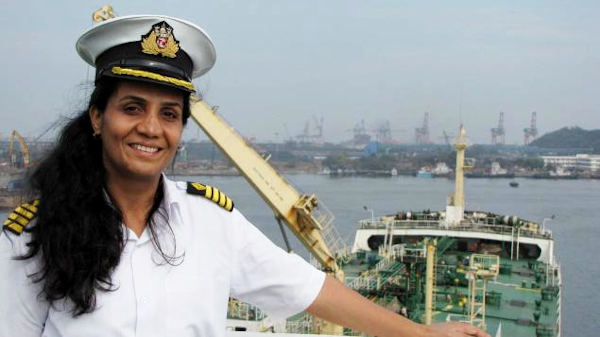Each year India celebrates April 5 as National Maritime Day (NMD), when SS Loyalty, the first ship of the Scindia Steam Navigation Company, set sail from Mumbai for the United Kingdom in 1919 and thus created nautical history. The NMD recognises the maritime sector’s contribution to the national economy through the facilitation of trade across the five oceans. While the maritime sector has several stakeholders and players, it is the ‘mariner’ in his merchantman (vessel) that constitutes the cutting edge of ocean trade and provides the connectivity of a several thousand nautical miles.
Historically and geopolitically India always has been a maritime nation. Skilful and courageous Indian sailors used the monsoon winds and the ‘Matsya Yantra’ or the magnetic compass to trade in spices, fabrics, pearls, etc., with countries of South-East Asia and the Arab world. In the process there has been a healthy exchange/osmosis of cultural, religious, ethnic and linguistic values and customs; the evidence of which is seen even today far and wide.
Today over 90 per cent of the country’s trade by volume and over 72 per cent by value, including crude oil, is shipped across the seas, which is vital for our economy and energy security. India possesses a fleet of about 1,300 ships of which only about 400 are foreign going. Most of these ships are, however, past their prime and only about 10 per cent of our trade is carried in Indian-flagged vessels. Indians however constitute about eight per cent of the global seafarers, a fact that we can justifiably be proud about.
Tough life
Life at sea is today a far cry from the times gone by and is certainly not for the faint hearted. From time immemorial men have been lured to the sea by stories of romance of the seas, distant exotic destinations, posters of ‘join the navy and see the world’, and bawdy stories with a girl in every port. The days of hard drinking and womanising are all over. In fact, women now serve at sea as equals, though their number is very small.
The Indian mariner is a highly trained and qualified professional. Technological advancements, globalisation and commercial interests have however taken away the charm of seafaring which is now mostly about long hours, dirty boiler suits, greasy hands, fatigue, stress and boredom. Life is an endless round of ‘watch keeping’ at sea, navigation, cargo work, engineering, maritime regulations, security, paperwork, etc. The pay is decent, but the flip sides are many.
Mariners can today spend up to about six months continuously at sea, cut off from their family and a social life with only the telephone and internet as their savior. Long before Covid-19 ensured that the world went into a lockdown, mariners have lived a life of isolation at sea in the confines of a ship, thousands of miles from home and land. The crew may not number more than 25-30, and invariably come from different countries around the world. Most mariners get very little time to step out in a foreign port. Automation in loading/unloading and high capacity discharging of oil, etc., means that the ships can be turned around in 8-12 hours, before they head out to sea again, to the next port of call.
The sea can often be cruel and treacherous and many a peril awaits the mariner unless he/she is alert and vigilant. Emergencies such as collision, grounding, fire and flooding are the nightmare of any mariner. As the ship crosses different time zones, the weather is constantly changing. While heavy seas and strong winds buffet the ship making it pitch and roll, a cyclone or a tropical revolving storm can make life very difficult indeed. Bouts of mal-de-mer or sea sickness can affect even the most seasoned sailor. Perhaps more than the weather, it is the pirates of the sea, off Somalia, in the Gulf of Guinea or the Malacca straits who can send a chill down the spine of most mariners.
Covid woes
And now we have the coronavirus. The closure of borders, flights and the lockdown have meant that thousands of seafarers who have finished their contracts are stuck at sea, unable to sign off at hub ports and return home. Those waiting ashore to join their ships too are facing similar problems. For those stuck on ships, the supplies such as fruits and vegetables are running low due to port restrictions. Perhaps our bureaucrats ashore in the Ministry of Shipping and the Directorate General of Shipping, who are mostly ‘landlubbers’ with not even a nodding acquaintance of seafaring, will lend an ear to those who maintain the global supply chains.
One hopes the citizens of this nation, in the midst of the national lockdown, will not wait for April 5 and will take time off to salute the merchant mariners for their services. Let’s wish them ‘fair winds and following seas’. May Lord Varuna, the lord of the seas, watch over them.
The writer is a former naval officer who has spent several years at sea, including in command of warships
Source: THBL
Image Courtesy: She The People
You may also like
-
Trade Connect E-platform For Exports Is Single Window, Fast, Accessible And Transformational: Shri Piyush Goyal
-
Dot Simplifies Approval Processes For Telecom Licenses And Wireless Equipment
-
Coal Production and Supply Trends on Positive Trajectory
-
Union Minister To Release Booklets On Promotion Of Indigenous Species & Conservation Of States Fishes
-
2nd India-Japan Finance Dialogue held in Tokyo on 6th September, 2024
